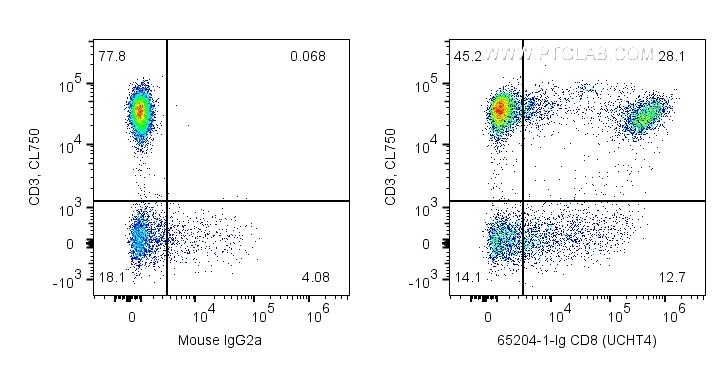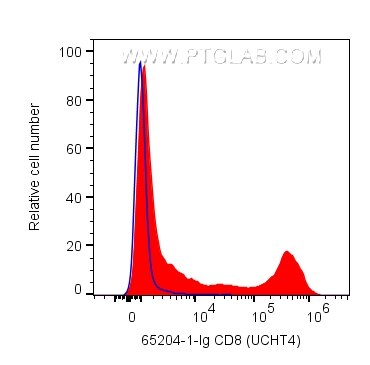Anticorps Monoclonal anti-CD8
CD8 Monoclonal Antibody for FC
Hôte / Isotype
Mouse / IgG2a
Réactivité testée
Humain
Applications
FC
Conjugaison
Non conjugué
CloneNo.
UCHT4
N° de cat : 65204-1-Ig
Synonymes
Galerie de données de validation
Applications testées
| Résultats positifs en cytométrie | CMSP humaines, |
Dilution recommandée
| Application | Dilution |
|---|---|
| This reagent has been tested for flow cytometric analysis. It is recommended that this reagent should be titrated in each testing system to obtain optimal results. | |
| Sample-dependent, check data in validation data gallery | |
Informations sur le produit
65204-1-Ig cible CD8 dans les applications de FC et montre une réactivité avec des échantillons Humain
| Réactivité | Humain |
| Hôte / Isotype | Mouse / IgG2a |
| Clonalité | Monoclonal |
| Type | Anticorps |
| Immunogène | Thymocytes et lymphocytes T de Sézary |
| Nom complet | CD8a molecule |
| Masse moléculaire calculée | 235 aa, 26 kDa |
| Numéro d’acquisition GenBank | BC025715 |
| Symbole du gène | CD8A |
| Identification du gène (NCBI) | 925 |
| Conjugaison | Non conjugué |
| Forme | Liquide |
| Méthode de purification | Purification par protéine A |
| Tampon de stockage | PBS with 0.09% sodium azide |
| Conditions de stockage | Store at 2-8°C. Stable for one year after shipment. |
Informations générales
CD8 is a transmembrane glycoprotein composed of two disulfide-linked chains. It can be present as a homodimer of CD8α or as a heterodimer of CD8α and CD8β (PMID: 3264320; 8253791). CD8 is found on most thymocytes. The majority of class I-restricted T cells express mostly the CD8αβ heterodimer while CD8αα homodimers alone have been found on some gut intraepithelial T cells , on some T cell receptor (TCR) γδ T cells and on NK cells (PMID: 2111591; 1831127; 8420975). CD8 acts as a co-receptor that binds to MHC class-I and participates in cytotoxic T cell activation (PMID: 8499079). During T cell development, CD8 is required for positive selection of CD4-/CD8+ T cells (PMID: 1968084).
Protocole
| Product Specific Protocols | |
|---|---|
| FC protocol for CD8 antibody 65204-1-Ig | Download protocol |
| Standard Protocols | |
|---|---|
| Click here to view our Standard Protocols |



